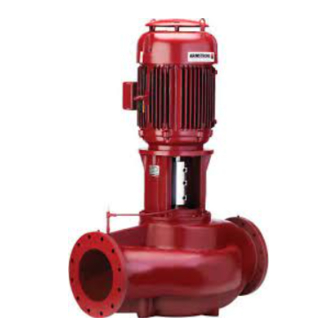i n sta l l at i on &
op era t i ng i n str u ct i on s
6
Remove coupling guard and place lifting straps on each side of coupling,
use spacer bar if necessary to protect motor fan cover.
important:
Do not run the pump for any length of time under
very low flow conditions or with the discharge valve
closed. This could cause the water in the casing to
reach super heated steam conditions, cause premature failure
and cause serious and dramatic damage to the pump and
surrounding area.
2.0 installation
2 .1 location
In open systems, locate the unit as close as practical to the
liquid being pumped, with a short, direct suction pipe. Ensure
adequate space is left above and around the unit for operation,
maintenance, service and inspection of parts.
In closed systems, where possible, the pumps should be in-
stalled immediately downstream of the expansion tank/make-
up connection. This is the point of zero pressure change and
is necessary for effective pump operation. Do not install more
than one expansion tank connection into any closed
hydronic system.
Electric motor driven pumps should not be located in damp or
dusty locations without special protection.
Airflow into the motor and/or motor fan should
not be obstructed.
Commercial pumps Series 4300, 4360 and 4380
Vertical In–Line pumps
2 . 2 installation
When installing Vertical In-Line pumps, an important consid-
eration to accrue full added-value from the pump design is to
ensure that the pump is pipe-mounted and free to 'float' with
any movement, expansion and contraction of the piping. Should
any Vertical In-Line pump use supports to the structure it is
imperative that no pipe strain is imposed on the pump flanges.
Telltale pieces of equipment such as springs or 'waffle' style
neoprene isolation pads that distort with pressure to indicate
added piping weight, should be used under pump supports
should the pump not be truly pipe mounted.
Various installation arrangements are detailed on Pages 6 and 7:
2.2.1
Vertical In-Line pumps may be installed directly in the system
piping with no additional support. Pipe hangers are simply sized
for the additional weight of the pumping unit. Many pumps are
installed in this manner and are mounted at sufficient height to
take zero floor space. (Fig. 2.1)
2.2.2
Piping, in many mechanical rooms, is hung close to the ceiling
and larger pumps are mounted near ground level for ease of
maintenance. Fig 2.2 illustrates such an arrangement with the
piping supported at the ceiling and the vil unit installed with
an Armstrong Suction Guide and triple function Flo-Trex valve.
Many very large vil pumps are installed in this manner.
2.2.3
Should additional space saving be required the discharge spool
piece and Flo-Trex valve may be replaced by a long-radius el-
bow and the Flo-Trex valve field converted to a straight-through
valve and installed in the vertical discharge pipe. (Fig. 2.3)
2.2.4
Fig 2.4 illustrates a similar arrangement to Fig 2.2 with
additional floor mounted pipe-stools isolated from the struc-
ture by 'waffle' style neoprene isolation pads under the
Armstrong Suction Guide and Flo-Trex valve.
2.2.5
Floor mounted saddle supports (Fig. 2.5) are typical for
condenser water pumps where the cooling tower base is near
mechanical room elevation.

